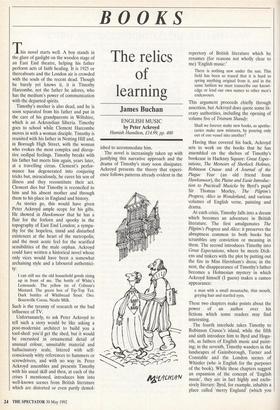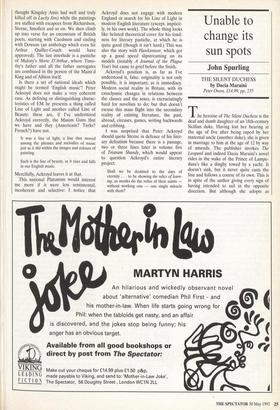BOOKS
The relics of learning
James Buchan
ENGLISH MUSIC by Peter Ackroyd
Hamish Hamilton, £14.99, pp. 400
This novel starts well. A boy stands in the glare of gaslight on the wooden stage of an East End theatre, helping his father perform acts of faith healing. It is 1925 or thereabouts and the London air is crowded with the souls of the recent dead. Though he barely yet knows it, it is Timothy Harcombe, not the father he adores, who has the medium's power of communication with the departed spirits.
Timothy's mother is also dead, and he is soon separated from his father and put in the care of his grandparents in Wiltshire, which is an Ackroydian Siberia. Timothy goes to school while Clement Harcombe moves in with a woman disciple. Timothy is reunited with his father in Notting Hill and, in Borough High Street, with the woman who evokes the most complex and disrup- tive oedipal feelings. Timothy breaks with his father but meets him again, years later, at a travelling circus. Clement's perfor- mance has degenerated into conjuring tricks but, miraculously, he cures his son of illness and they reconstitute their act. Clement dies but Timothy is reconciled to him and his absent mother and through them to his place in England and history.
As stories go, this would have given Peter Ackroyd ample scope for his gifts. He showed in Hawksmoor that he has a flair for the forlorn and spooky in the topography of East End London; a sympa- thy for the hopeless, timid and disturbed existences at the heart of the metropolis; and the most acute feel for the scarified sensibilities of the male orphan. Ackroyd could have written a historical novel whose only vices would have been a somewhat archaising style and a laboured authentici- ty:
I can still see the old household goods rising up in front of me. The bottle of White's Lemonade. The yellow tin of Colman's Mustard. The green box of Tip-Top Tea. Dark bottles of Whitbread Stout. Oxo. Bournville Cocoa. Nestle Milk.
Such is the tyranny of research or the bad influence of TV.
Unfortunately, to ask Peter Ackroyd to tell such a story would be like asking a post-modernist architect to build you a tool-shed: you'd get the shed, but it would be encrusted in ornamental detail of unusual colour, unsuitable material and hallucinatory scale, littered with self- consciously witty references to hammers or screwdrivers, and with no way in. Peter Ackroyd assembles and presents Timothy with his usual skill and then, at each of the crises I mentioned, introduces him into well-known scenes from British literature which are distorted or even partly demol- ished to accommodate him.
The novel is increasingly taken up with justifying this narrative approach and the drama of Timothy's story soon dissipates. Ackroyd presents the theory that experi- ence follows patterns already evident in the repertory of British literature which he renames (for reasons not wholly clear to me) 'English music:'
There is nothing new under the sun. This field has been so traced that it is hard to spring anything original from it, and in the same fashion we must transcribe our knowl- edge or lend our own names to other men's endeavours.
This argument proceeds chiefly through assertion, but Ackroyd does quote some lit- erary authorities, including the opening of volume five of Tristram Shandy:
Shall we forever make new books, as apothe- caries make new mixtures, by pouring only out of one vessel into another?
Having thus covered his back, Ackroyd sets to work on the books that he has assembled on the shelves of Timothy's bookcase in Hackney Square: Great Expec- tations, The Memoirs of Sherlock Holmes, Robinson Crusoe and A Journal of the Plague Year (an old friend from Hawksmoor), the Plaine and Easie Introduc- tion to Practical! Musicke by Byrd's pupil Sir Thomas Morley, The Pilgrim's Progress, Alice in Wonderland, and various volumes of English verse, painting and drama.
At each crisis, Timothy falls into a dream which becomes an adventure in British literature. The first amalgamates The Pilgrim's Progress and Alice: it preserves the abruptness common to both books but scrambles any conviction or meaning in them. The second introduces Timothy into Great Expectations, where he meets Dia- ens and tinkers with the plot by putting out the fire in Miss Havisham's dress; in the next, the disappearance of Timothy's father becomes a Holmesian mystery in which Ackroyd himself (I guess) makes a cameo appearance: a man with a small moustache, thin mouth, greying hair and startled eyes.
These two chapters make points about the power of an author over his fictions which some readers may find interesting.
The fourth interlude takes Timothy to Robinson Crusoe's island, while the fifth and sixth introduce him to Byrd and Hoga- rth, as fathers of English music and paint- ing; in the seventh, Timothy wanders in the landscapes of Gainsborough, Turner and Constable and the London scenes of Whistler (who is English for the purposes of the book). While these chapters suggest an expansion of the concept of 'English music', they are in fact highly and exclu- sively literary: Byrd, for example, inhabits a place called 'merry England' (which you
thought Kingsley Amis had well and truly killed off in Lucky Jim) while the paintings are staffed with escapees from Richardson, Sterne, Smollett and so on. We then climb up into verse for an encomium of British poets, starting with Caedmon and ending with Dowson (an anthology which even Sir Arthur Quiller-Couch would have approved). The last interlude is a pastiche of Malory's Morte D'Arthur, where Timo- thy's father and all the father surrogates are combined in the person of the Maim'd King and of Albion itself.
Is there a set of national ideals which might be termed 'English music'? Peter Ackroyd does not make a very coherent case. As defining or distinguishing charac- teristics of EM he presents a thing called Line of Light and another called Line of Beauty: these are, if I've understood Ackroyd correctly, the Maxim Guns that we have and they (Americans? Turks? French?) have not.
It was a line of light, a line that moved among the phrases and melodies of music just as it did within the images and colours of painting.
Such is the line of beauty, as it rises and falls in our English music.
Mercifully, Ackroyd leaves it at that.
This national Platonism would interest me more if it were less sentimental, incoherent and selective: I notice that
Ackroyd does not engage with modern England or search for his Line of Light in modern English literature (except, implicit- ly, in his own work). The whole thing looks like belated theoretical cover for his fond- ness for literary pastiche, at which he is quite good (though it isn't hard.) This was also the story with Hawksmoor, which got up a good speed slipstreaming on its models (notably A Journal of the Plague Year) but came to grief before the finish.
Ackroyd's position is, as far as I've understood it, false: originality is not only possible, it is important; as is immediacy. Modern social reality in Britain, with its cataclysmic changes in relations between the classes and the sexes, is excruciatingly hard for novelists to do; but that doesn't excuse this mass flight into the secondary reality of existing literature, the past, abroad, circuses, games, writing backwards and cribbing.
I was surprised that Peter Ackroyd should quote Sterne in defence of his liter- ary defeatism because there is a passage, two or three lines later in volume five of Tristram Shandy, which would appear to question Ackroyd's entire literary project: Shall we be destined to the days of eternity . . . to be showing the relics of learn- ing, as monks do the relics of their saints without working one — one single miracle with them?

















































 Previous page
Previous page